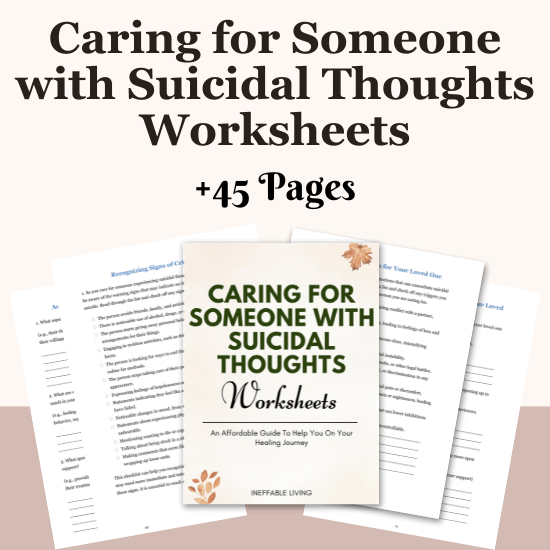Recognizing the warning signs of suicide in loved ones is essential for providing timely support and intervention.
People considering suicide often show signs of emotional distress, behavioral changes, or verbal cues.
By understanding these signs, you can better support those who may be struggling.
Here are common warning signs and tips on how to respond.
How to Recognize the Warning Signs of Suicide in Loved Ones?
1. Expressing Feelings of Hopelessness or Worthlessness
People who are contemplating suicide may feel hopeless or believe there’s no way out of their pain. They might also express feelings of worthlessness or self-criticism.
What to Watch For: Statements like “Things will never get better,” “I feel trapped,” or “I’m a burden to everyone.” They may also speak negatively about themselves or say they feel like a failure. These expressions of despair are serious red flags.
2. Withdrawing from Social Connections
Isolation and withdrawal from family, friends, or activities they once enjoyed can indicate that someone is struggling. This behavior often stems from feelings of loneliness, shame, or the belief that they’re a burden to others.
What to Watch For: Notice if they’re avoiding social gatherings, not returning calls or messages, or seem less engaged. They may start canceling plans or stop participating in activities they once enjoyed. Sudden isolation from close relationships is a significant warning sign.
Related: Top 10 Social Withdrawal Signs — & How To Social Isolation? (Hikikomori Syndrome)
3. Sudden Mood Swings or Dramatic Behavioral Changes
Extreme mood swings or abrupt changes in behavior may indicate underlying distress. This can include sudden calmness after a period of depression, which can sometimes signal that they’ve made the decision to act on suicidal thoughts.
What to Watch For: Pay attention to shifts from deep sadness to unusual calmness, sudden agitation, anger, or irritability. Behavioral changes like increased risk-taking, recklessness, or extreme calmness following intense depression can indicate someone is contemplating suicide.
4. Talking About Death or Dying
People struggling with suicidal thoughts may talk about death frequently, either directly or indirectly. They might express fascination with the topic or make offhand remarks about ending their life.
What to Watch For: Listen for statements like “I wish I could just disappear,” “I’d be better off dead,” or “Everyone would be better without me.” They may also talk about suicide in vague terms or make comments that hint at self-harm or ending their life.
Related: High Functioning Depression Test (+Effective 3-Step Guide To Overcome High Functioning Depression)
5. Giving Away Belongings or Putting Affairs in Order
Someone considering suicide may give away cherished belongings, make amends with people, or take steps to “put their affairs in order.” This behavior often indicates they’re planning for the possibility of not being around.
What to Watch For: Look for signs that they’re giving away valued items, making arrangements for pets or finances, or organizing personal belongings. They might also apologize or try to “make peace” with people they’ve had conflicts with, as if tying up loose ends.
6. Changes in Eating or Sleeping Patterns
Sudden changes in eating or sleeping habits, such as sleeping too much, too little, or a noticeable lack of appetite, can signal deep emotional distress. These changes often reflect underlying mental health struggles.
What to Watch For: Notice if they’re sleeping excessively, suffering from insomnia, or displaying unusual changes in appetite, leading to weight gain or loss. Disrupted routines can be a physical manifestation of emotional turmoil.
7. Engaging in Risky or Self-Destructive Behavior
Engaging in risky or reckless behavior, like excessive drinking, drug use, or dangerous activities, can be a coping mechanism or an indication of self-destructive thoughts.
What to Watch For: Look for sudden increases in substance use, reckless driving, or risky activities that seem out of character. Increased impulsivity and self-destructive behavior can indicate a disregard for their own well-being and potential suicidal ideation.
Related: Top 10 Signs of Silent Depression
8. Frequent Expressions of Physical Pain or Fatigue
Emotional distress can often manifest physically as chronic pain, fatigue, or other unexplained physical symptoms. People dealing with suicidal thoughts may frequently talk about feeling exhausted, drained, or in physical pain.
What to Watch For: Notice if they frequently mention feeling tired, unwell, or complain of chronic pain with no clear medical cause. Expressions of physical suffering can sometimes reflect the intense emotional pain they’re experiencing.
9. Loss of Interest in Hobbies and Activities
A sudden disinterest in hobbies, work, or social activities they once found enjoyable can indicate emotional distress or depression, which are often linked to suicidal ideation.
What to Watch For: If they no longer participate in activities they once enjoyed, or seem indifferent toward people and interests that used to bring them joy, this could signal a deeper issue.
10. Increased Feelings of Burden or Self-Loathing
People who feel like a burden to others may believe their absence would relieve those they love. Self-loathing and guilt are common feelings for those struggling with suicidal thoughts.
What to Watch For: Listen for statements like “You’d be better off without me” or “I’m just causing problems for everyone.” Expressions of guilt, self-hatred, or feeling like a burden can indicate a risk of suicide.
Related: The Silent Struggle: How to Manage Depression-Related Anger?
How to Offer Support if You Notice Warning Signs?
If you’re concerned about a loved one, approach them with compassion and openness. Here are some ways to offer support:
1. Ask Directly About Their Feelings
Asking directly about suicide doesn’t increase the risk; it can provide relief and open up an opportunity for honest conversation. Try saying, “I’ve noticed you seem really down lately. Are you thinking about hurting yourself?” or “Are you having thoughts of suicide?”
2. Listen Without Judgment
Give them your full attention, avoid interrupting, and let them express their feelings. Avoid minimizing their feelings or offering “quick fixes.” Just being there to listen can make a big difference.
Related: How To Ask For Help With Depression? Top 10 Tips
3. Reassure Them They’re Not Alone
Let them know you’re there for them and that they don’t have to go through this alone. Reassure them that help is available and that what they’re feeling can get better with support.
4. Encourage Professional Help
Encourage them to reach out to a mental health professional, like a counselor or therapist. Offer to help them find resources or even accompany them to an appointment if they feel comfortable.
5. Follow Up and Stay Connected
Keep in touch with them regularly, especially in the days and weeks after you’ve noticed warning signs. Consistent check-ins show that you care and can provide ongoing support during a difficult time.
6. Seek Immediate Help if They’re in Crisis
If someone expresses an immediate plan or intent to harm themselves, do not leave them alone. Contact a mental health crisis line, reach out to a healthcare provider, or take them to the nearest emergency room for immediate assistance.
Related: How To Validate Someone’s Feelings Without Agreeing? (+Examples of Validating Statements)

Conclusion
Recognizing the warning signs of suicide and offering support can be life-saving.
Remember, you don’t have to have all the answers—simply being there and showing compassion can make a meaningful difference.
If you’re ever in doubt, reach out for professional support, and prioritize your loved one’s safety and well-being.



